- Home
- Tracy Chevalier
The Virgin Blue Page 28
The Virgin Blue Read online
Page 28
‘Is this – change in your feelings temporary or permanent?’ Rick asked when I'd stopped crying.
‘I don't know.’
He tried again. ‘This album thing you talked about. Does it ever change back? You know – do you ever get reobsessed with it?’
I thought about it. ‘Sometimes.’ But never for very long, I added to myself. The feeling never really returns.
‘So maybe the situation will change.’
‘Rick, all I know is that right now I can't come back with you.’ I could feel tears gathering behind my eyes again.
‘You know,’ I added, ‘I haven't even told you what happened in Switzerland. And in France too. What I found out about the Tourniers. A whole story. I could tell a whole story – filling in some gaps here and there. You see, it's like this whole different life is going on with me that you don't know anything about.’
Rick pinched his nose at the top of his brow between his thumb and forefinger. ‘Write it down,’ he said. He glanced at my psoriasis again. ‘Right now I gotta get out of here. It's too hot in here.’
When I got back Mathilde was still up, reading a magazine in the living room, her long legs propped up on the glass coffee table. She looked up at me inquiringly. I flopped down on the sofa and stared at the ceiling.
‘Rick wants to move to Germany,’ I announced.
‘Vraiment? That's sudden.’
‘Yes. I'm not going with him.’
‘To Germany?’ She made a face. ‘Of course not!’
I snorted. ‘Tell me, do you like any other country besides France?’
‘America.’
‘But you haven't even been there!’
‘Yes, but I'm sure I'd love it.’
‘It's hard to imagine going back. California would seem so alien.’
‘Is that what you're going to do?’
‘I don't know. But I'm not going to Germany.’
‘Did you tell Rick you're pregnant?’
I sat up. ‘How did you know?’
‘It's obvious! You're tired, food bothers you, though you eat a lot when you do eat. And when you're not talking you look like you're listening to something inside you. I remember it well from Sylvie. So who is the father?’
‘Rick.’
‘You are sure?’
‘Yes. We had been trying to conceive for a while, then we stopped, but obviously not before I got pregnant. Now that I think about it, I've had the symptoms for a few weeks.’
‘And Jean-Paul?’
I turned onto my stomach and pressed my face into one of the sofa cushions. ‘What about him?’
‘Are you going to see him? Talk to him?’
‘What can I say to him that he'd want to hear?’
‘Mais – of course he would want to hear from you, even bad news. You haven't been very kind to him.’
‘Oh, I don't know about that. I thought I was being kind not contacting him.’
To my relief Mathilde changed the subject. ‘I'm taking Wednesday off,’ she said, ‘to go to Le Pont de Montvert, as you suggested. We'll take Sylvie too. She loves it up there. And of course you can see Monsieur Jourdain again.’
‘Oh, I can't wait.’
She shrieked and we began to laugh.
Wednesday morning Sylvie insisted on helping me dress. She came into the bathroom where I'd been changing into white shorts and an oatmeal-coloured shirt and leaned against the sink, watching me.
‘Why do you wear white all the time?’ she asked.
Oh, God, here we go again, I thought. ‘This shirt is not white,’ I stated. ‘It's – like the colour of cereal.’ I didn't know how to say oatmeal.
‘No, it isn't. My cornflakes are orange!’
I'd eaten three bowls of cornflakes earlier and was still hungry.
‘Alors, what would you like me to wear?’
Sylvie clapped her hands and ran into the living room, where she began looking through my bag. ‘All your clothes are white or brown!’ she cried, disappointed. She pulled out Jean-Paul's blue shirt. ‘Except this. Wear this,’ she commanded. ‘How come you haven't worn this before?’
Jacob had washed the shirt for me in Moutier. The blood had mostly come out, but left a rusty outline on the back. I thought it wasn't noticeable unless you looked for it, but Mathilde spotted it immediately when I put it on. I caught her raised eyebrows and craned my neck to look down at my back.
‘You don't want to know,’ I said.
She laughed. ‘A life full of drama, eh?’
‘It wasn't like this before, I promise!’
Mathilde glanced at her watch. ‘Let's go, Monsieur Jourdain will be waiting for us,’ she said. She opened the hall closet, took out the gym bag and handed it to me.
‘You really called him?’
‘Listen, Ella, he is a good man. He has good intentions. Now that he knows your family really was from the area, he'll treat you like a long-lost niece.’
‘Is Monsieur Jourdain the man who called me Mademoiselle? With the black hair?’ Sylvie asked.
‘No, that was Jean-Paul. Monsieur Jourdain was the old man who fell off his stool. You remember?’
‘I liked Jean-Paul. Will we see him?’
Mathilde grinned at me. ‘Look, this is his shirt,’ she said, pulling at one of the shirt tails.
Sylvie gazed up at me. ‘Then why are you wearing it?’ I blushed and Mathilde laughed.
It was a beautiful day, hot in Mende but crisp and cool the further into the mountains we drove. We sang all the way there, Sylvie teaching me the songs she'd learned at her camp. It felt strange singing on our way to a burial, but not inappropriate. We were bringing Marie home.
When we pulled up to the mairie in Le Pont de Montvert, Monsieur Jourdain appeared immediately in the doorway. He shook hands with all of us, even Sylvie, and held on to my hand for a moment. ‘Madame,’ he said, and smiled at me. He still made me nervous; maybe he knew that, for his smile had a desperate air, like a child who wants to be accepted as an adult.
‘Let's have coffee,’ he said hurriedly, and ushered us down to the café. We ordered coffees and an Orangina for Sylvie, who didn't stay long at the table once she discovered the café's cat. We adults sat in awkward silence for a minute before Mathilde slapped the table and cried, ‘The map! I'll just get it from the car. We want to show you where we're going.’ She jumped up and left us alone.
Monsieur Jourdain cleared his throat; for a second I thought he was going to spit. ‘Listen, La Rousse,’ he began. ‘You know I said I would try to find out about some of the family listed in your Bible?’
‘Yes.’
‘Alors, I found someone.’
‘What, a Tournier?’
‘Not a Tournier, no. Her name is Elisabeth Moulinier. She is the granddaughter of a man who lived in l'Hôpital, a village not far from here. It was his Bible. She brought it here when he died.’
‘Did you know her grandfather?’
Monsieur Jourdain pursed his lips. ‘No,’ he said shortly.
‘But – I thought that you knew everyone around here. Mathilde said so.’
He frowned. ‘He was a Catholic,’ he muttered.
‘Oh, for God's sake!’ I burst out.
He looked embarrassed but stubborn too.
‘Never mind,’ I muttered, shaking my head.
‘Anyway, I told this Elisabeth you would be here today. She is coming to see you.’
‘That's –’ What is it, Ella? I thought. Great? Do you want to be connected with this family?
‘That was kind of you to arrange it,’ I said. ‘Thank you.’
Mathilde returned then with the map and we spread it out on the table.
‘La Baume du Monsieur is a hill,’ Monsieur Jourdain explained. ‘There are some ruins of a farm, here, you see?’ He pointed to a tiny symbol. ‘You go now and I will bring Madame Moulinier to you there, in an hour or two.’
When I saw the car parked at the side of the road, dusty and battered, my stomach
lurched. Mathilde, I thought. She does love making phone calls. I glanced at her. She pulled up behind it, trying to look innocent, but I could see the trace of a self-satisfied smile. When she caught my eye she shrugged.
‘Why don't you go on ahead?’ she said. ‘Sylvie and I will have a look at the river, won't we, Sylvie? We'll come find you later. Go on.’
I hesitated, then picked up the gym bag, a shovel and the map, and started up the path. Then I stopped and turned around. ‘Thanks,’ I said.
Mathilde smiled and waved a hand at me. ‘Vas-y, chérie.’
He was sitting on the crumbled remains of a chimney, his back to me, smoking a cigarette. He was wearing the salmon-coloured shirt; the sun gleamed in his hair. He looked so real, so at home with himself and his surroundings that I almost couldn't look at him, it hurt so much. I felt a rush of longing for him, to smell him and touch his warm skin.
When he saw me he flicked his cigarette away but remained sitting. I set down the bag and the shovel. I wanted to put my arms around him, press my nose into his neck and burst into tears, but couldn't. Not until I had told him. The effort to keep from touching him was almost unbearable, and so distracting that I missed his first words and had to ask him to repeat them.
He didn't repeat them. He just looked at me for a long time, studying my face. He tried to remain expressionless, but I could see it was a struggle for him.
‘Jean-Paul, I am so sorry,’ I murmured in French.
‘Why? Why are you sorry?’
‘Oh.’ I linked my hands behind my neck. ‘There's so much to tell you, I don't even know where to begin.’ My jaw began to tremble and I pressed my elbows into my chest to keep myself from shaking.
He reached over and touched my bruised forehead.
‘How did you get this?’
I smiled grimly. ‘From life.’
‘Tell me about it, then,’ he said. ‘And about why you are here with that.’ He nodded at the bag. ‘Tell me in English. You speak in English when you need to, and I speak in French when I need to.’
I'd never thought of doing it that way. He was right: it would be too much to say what I had to say in French.
‘The bag is full of bones,’ I explained, crossing my arms and resting my weight on one hip. ‘Of a girl. I can tell from the size and shape of the bones, plus there are remains of what looks like a dress, and hair. I found them under the hearth of a farm they say was the Tournier farm for a long time. In Switzerland. I think they're the bones of Marie Tournier.’
I stopped my halting explanation and waited for him to challenge me. When he didn't I found myself trying to answer his unspoken questions. ‘In our family names have been passed down even up to the present. There are still Jacobs and Jeans, and Hannahs and Susannes. It's like a commemoration. All the original names still survive, except for Marie and Isabelle. Now I know you'll think I'm making something out of nothing, and with no proof, but I think that meant they did something wrong, they died or were shunned, or something. And the family dropped their names.’
Jean-Paul lit a cigarette and drew on it deeply.
‘There are other things, the kind of evidence you'll be suspicious of. Like her hair, the hair there in the bag, is the same colour as mine. As mine turned when I came here. And when we were lifting the hearthstone and it fell back it made this noise I've heard in my nightmare. This big groaning boom. Exactly the same. But mostly it's the blue. The bits of dress are exactly the blue I dreamed of. The Virgin blue.’
‘The Tournier blue,’ he said.
‘Yes. It's all coincidence, you'll say. I know how you feel about coincidence. But there's too much of it, you see. Too much for me.’
Jean-Paul stood up and shook his legs, then began pacing around the ruin. He walked all the way around it.
‘This is the Mas de la Baume du Monsieur, yes?’ he asked when he returned to me. ‘The farm listed in the Bible?’
I nodded. ‘We're going to bury the bones here.’
‘May I look?’ Jean-Paul gestured at the bag.
‘Yes.’ He had an idea: I knew him well enough to read the signs. It was oddly comforting. My stomach, jittery since seeing the Deux Chevaux, settled down and demanded food. I sat on the rocks and watched him. He knelt and opened the bag, spreading it wide. He looked for a long time, touched the hair briefly, fingered the blue cloth. He glanced up, looking me up and down; I remembered I was wearing his shirt. The blue and the red.
‘I didn't wear it deliberately, really,’ I said. ‘I didn't know you would be here. Sylvie made me wear it. She said I wasn't wearing enough colour.’
He smiled.
‘Hey, speaking of which, it turns out Goethe stayed in Moutier for a night.’
Jean-Paul snorted. ‘That is no great boast. He stayed everywhere for a night.’
‘I suppose you've read everything by Goethe.’
‘What was it you said once? You would bring up someone like Goethe right now.’
I smiled. ‘Touché. Anyway, I'm sorry I took your shirt. And it got – I had kind of an accident with it.’
He scrutinized it. ‘It looks all right to me.’
‘You haven't seen the back. No, I'm not going to show it to you. That's another story.’
Jean-Paul zipped the bag shut.
‘I have an idea,’ he said. ‘But it may upset you.’
‘Nothing can upset me more than everything already has.’
‘I want to dig here. By the chimney.’
‘Why?’
‘Just a theory.’ He crouched by the remains of the hearth. There wasn't much left of it. It had been a large slab of granite, like the one in Moutier, but it had cracked down the middle and was crumbling away.
‘Look, I don't want to bury her right there, if that's what you're thinking,’ I said. ‘That's the last place I want to put her.’
‘No, of course not. I just want to look for something.’
I watched him shift bits of stone for a while, then got down on my knees and helped him, avoiding the larger rocks, careful of my abdomen. At one point he glanced at my back, then reached over and traced the outline of blood on the shirt with his finger. I remained hunched over, my arms and legs pricked with goosebumps. Jean-Paul moved his finger up my neck and onto my scalp, where he spread his fingers and pulled them through my hair like a comb.
His hand stopped. ‘You do not want me to touch you,’ he said; it was a statement rather than a question.
‘You won't want to touch me when you've heard everything. I haven't told you everything yet.’
Jean-Paul dropped his hand and picked up the shovel. ‘Tell me later,’ he said, and began to dig.
I wasn't really surprised when he found the teeth. He held them out to me in silence. I took them, opened the gym bag and got out the other set. They were the same size: children's teeth. They felt sharp in my hands.
‘Why?’ I said.
‘In some cultures people bury things in the foundations of houses when they're built. Bodies of animals, sometimes shoes. Sometimes, not often, humans. The idea was that their souls would remain with the house and scare away evil spirits.’
There was a long silence.
‘They were sacrificed, you mean. These children were sacrificed.’ 293
‘Maybe. Probably. It is too much of a coincidence to find bones under the hearths of both houses for it to be accidental.’
‘But – they were Christian. They were supposed to be God-fearing, not superstitious!’
‘Religion has never completely destroyed superstition. Christianity was like a layer over the older beliefs – it covered them but they didn't disappear.’
I looked at the two sets of teeth and shivered. ‘Jesus. What a family. And I'm one of them. I'm a Tournier too.’ I was beginning to shake.
‘Ella. You are far away from them,’ Jean-Paul said gently. ‘You belong to the twentieth century. You are not responsible for their actions. And remember that you are as much a product of your mother's family
as your father's.’
‘But I'm still a Tournier.’
‘Yes, but you do not have to pay for their sins.’
I stared at him. ‘I've never heard you use that word before.’

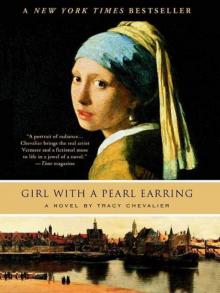 Girl With a Pearl Earring
Girl With a Pearl Earring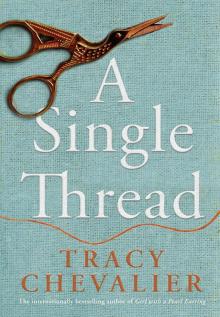 A Single Thread
A Single Thread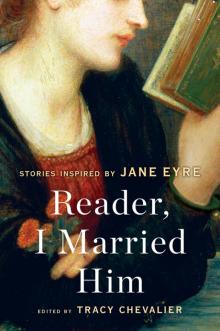 Reader, I Married Him: Stories Inspired by Jane Eyre
Reader, I Married Him: Stories Inspired by Jane Eyre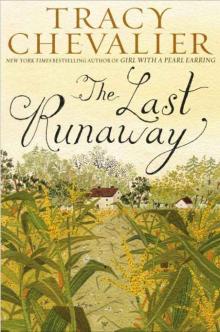 The Last Runaway
The Last Runaway Burning Bright
Burning Bright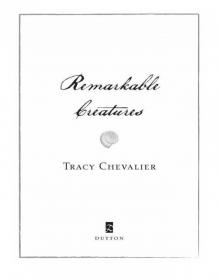 Remarkable Creatures
Remarkable Creatures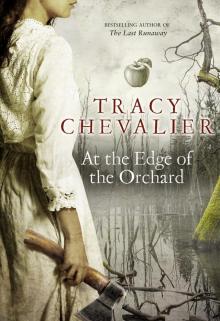 At the Edge of the Orchard
At the Edge of the Orchard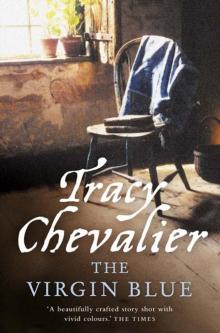 The Virgin Blue
The Virgin Blue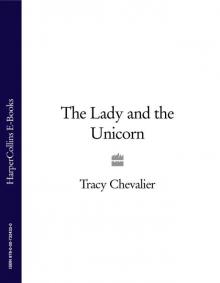 The Lady and the Unicorn
The Lady and the Unicorn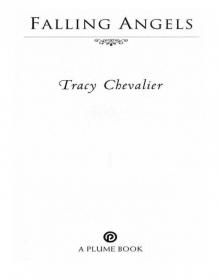 Falling Angels
Falling Angels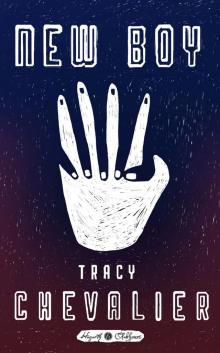 New Boy
New Boy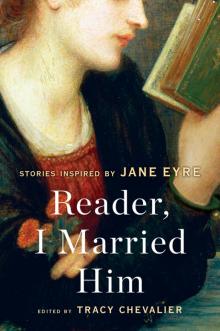 Reader, I Married Him
Reader, I Married Him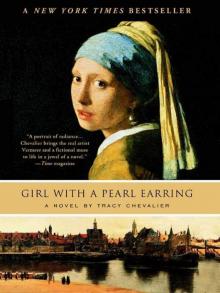 Girl with a Pearl Earring, The
Girl with a Pearl Earring, The